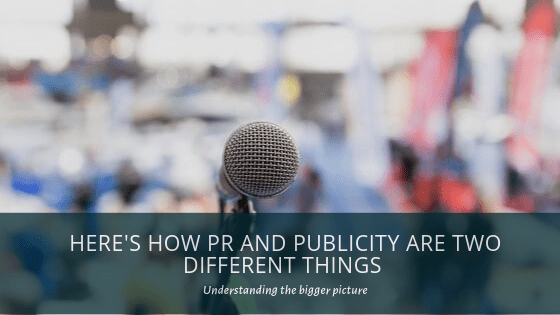More often than not, organizations conflate publicity and PR. However, doing so can put companies at a disadvantage. In reality, publicity is just one aspect of PR. Publicity isn’t necessarily a bad thing, but it’s part of a bigger picture.
What is the difference between PR and publicity?
Publicity is about media presence. At its core, it’s simply about attention. Publicity might consist of news articles and stories, or details about relevant events. It creates awareness of a brand. Should you hire a publicist, their job is to promote your company so people are aware of it. Publicity tends to centre around a low-cost, short-term goal.
PR, on the other hand, is an all-encompassing management tool. A PR professional will be well-versed in creating long-term strategies aimed at achieving numerous goals. Additionally, a company rarely has control over publicity, so it can be either positive or negative. Conversely, PR is controlled by a company and is therefore always positive.
What does PR cover?

PR is about constructing meaningful relationships with the public. In this case, “the public” can consist of customers, shareholders, suppliers, investors, and even the government. Building and maintaining these relationships creates a positive brand image. To accomplish a company’s goals, PR strategists aim to positively influence public attitudes towards the organisation. Below are some examples of what a managed PR campaign might include.
Media kits
A media kit is a carefully curated collection of information and promotional material related to your company. Also known as a press kit, these are critical for ensuring the media maintains your brand integrity. Having an easy-to-access media kit means a journalist find accurate information before writing about your company. Your kit includes things like your company and executive bios, as well as graphic elements like logos.
Media monitoring
PR professionals will have their pulse on the current media trends. Being aware of what’s happening in the media means you can disseminate information more effectively. You can also tailor your message in a way that will receive positive attention and more of it. PR specialists have access to a number of effective monitoring tools at their disposal.
Crisis management
How a company responds to a crisis is critical when it comes to public perception and effective PR is crucial for damage control. This could involve preparing and releasing a holding statement or managing media queries. These days, the internet means news travels at lightspeed, so a rapid and managed response is key.
We explore the important elements of a holding statement in crisis PR.
Reputation management

Reputation management is a balancing act. On the one hand, transparency is important for maintaining consumer trust. On the other, you don’t want inaccurate and damaging articles floating around online. For example, negative reviews can be used to build customer faith, but only when responded to properly. In some cases, a PR specialist may need to employ SEO techniques to bury unfair reports at the bottom of search engine results.
We discuss the role of PR ethics in reputation management.
Pitching
To gain an audience with the best media outlets, you need a perfect pitch. PR professionals are well-versed in pitch-writing. They’ll know the best approaches to take, and likely have a list of valuable media contacts too.
We share key elements of a PR pitch with a personality.
Social media engagement
Nearly every business makes the most of social media marketing. These days, however, posting great content isn’t enough on its own. To build relationships, your brand has to actively engage and respond to users online. You’ve likely seen the buzz surrounding brands that do this successfully. PR professionals carefully maintain your brand’s online persona by being an active part of the conversation.
Media advice

While publicity might get you attention, how do you respond to that attention? Whether it’s positive or negative, your response to publicity is of utmost importance. Saying the wrong thing could sour a good reception or make poor perception worse. A media advisor can tell a business when and how to respond to avoid any pitfalls. On the flip side, their advice can boost your reputation.
Hopefully, by now you’re more familiar with the differences between publicity and PR. Publicity is important, but it’s just one aspect of PR. With a proper PR strategy in place, you can build and maintain relationships that will maximise your reputation. You’ll also have much more control over public reception with a managed PR strategy.
Publicity is certainly a good way to hit your goals, but only if your PR strategy can direct it effectively. There’s definitely an appeal to the low costs of publicity. However, it’s best to avoid relying on a publicity-only approach without someone who can help you set and meet your goals.
If you’re curious to learn more about public relations or want to speak to a SYNC consultant about starting your brand’s PR journey, contact us at hello@syncpr.co

